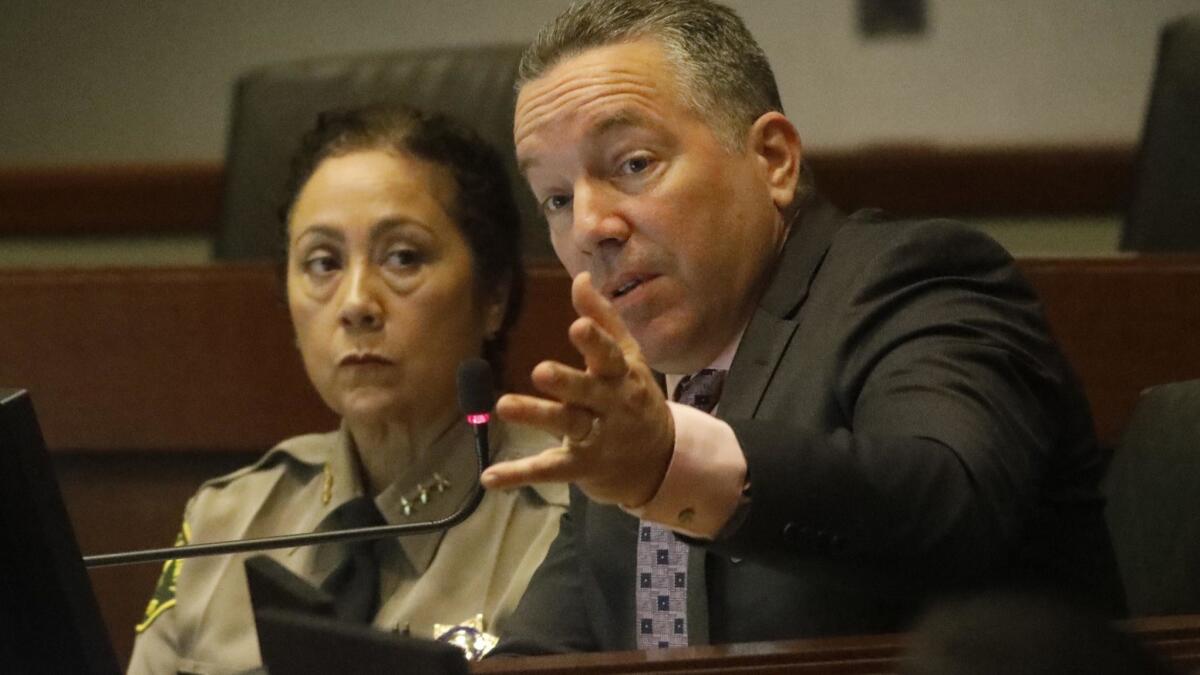L.A. County sheriff cannot ignore watchdog’s subpoena, judge rules

- Share via
A California judge Friday put Los Angeles County Sheriff Alex Villanueva on his heels in his running power struggle with county officials, upholding the authority of an oversight commission to compel the sheriff to answer questions about how he runs the department.
In a hearing in her downtown courtroom, Superior Court Judge Holly J. Fujie ruled that the Civilian Oversight Commission, a watchdog group appointed by the county’s Board of Supervisors, was well within its power when it directed the county’s inspector general to subpoena the sheriff in May to testify about how the department was responding to the coronavirus inside the nation’s largest jail system.
Villanueva refused to appear, triggering the legal fight before Fujie. The judge’s ruling delivered a potent victory to county officials who have accused the sheriff of rebuffing calls for transparency and efforts to hold him accountable.
Fujie set a hearing for January, when lawyers for Villanueva will have to explain why the sheriff should not be held in contempt of court for his refusal to appear before the commission.
The legal battle became a litmus test of the commission’s newly minted power to issue subpoenas as a tool to keep the sheriff in check. The Board of Supervisors granted the commission the authority in January; voters in March overwhelmingly approved Measure R, which reaffirmed the commission’s right to do so. In September, Gov. Gavin Newsom gave the right to subpoena to oversight bodies statewide when he signed Assembly Bill 1185 into law.
Nonetheless, Villanueva has challenged the legality of the subpoena ordering him to testify before the commission, describing it at a news conference as a “public shaming endeavor.” His attorney argued during Friday’s hearing and in written filings that the subpoena was an abuse of power and that Villanueva met his obligation to the commission by sending to the meeting an assistant sheriff who was knowledgeable about the department’s pandemic response in the jails.
In a statement after Friday’s hearing, a Sheriff’s Department spokesman criticized the inspector general’s “heavy-handed” approach of issuing a subpoena.
“As has been the case all along, this expense to taxpayers could be avoided if the Office of the Inspector General would come to the table and negotiate a meaningful way to exchange information,” Lt. John Satterfield said.
The inspector general, Max Huntsman, reports to the Board of Supervisors and the oversight commission.
Fujie knocked down the sheriff’s legal claims, saying that state law and county codes are clear the commission can compel the sheriff to answer its questions and that the subpoena did not cross the line into interfering with Villanueva’s operation of the jails. The subpoena, she pointed out, clearly called for Villanueva, not someone else, to appear, and “the Commission did not exceed its authority by directing the issuance of the Subpoena.”
The judge said the commission is authorized to issue subpoenas as a way to compel testimony and to force the department to hand over internal records when it deems the move necessary. The county office of the inspector general, which reports to the commission, has said it’s been stonewalled when seeking information about the agency’s internal discipline system and hiring process, as well as documents related to deputy shootings and secret deputy cliques with matching tattoos that have been accused of misconduct.
After Villanueva chose not to appear voluntarily at a May 7 meeting, the commissioners voted unanimously to subpoena him, in the first use of their new power. He again did not show up, sending Asst. Sheriff Bruce Chase to answer questions instead.
County lawyers then asked a judge to order Villanueva to attend, saying the panel is “entitled to hear directly from the boss of the department to address the public’s concerns regarding the effects of COVID-19 on the jails.”
In a court filing, lawyers representing Villanueva argued that the sheriff is not accountable to the commission.
“The duties of the COC are to advise and make recommendations to the Board of Supervisors and the Sheriff, not to cross examine him, compel him, harass or bully him, or question him in a public forum on matters in which he is named as an individual defendant,” Villanueva’s filing said, pointing to litigation in which civil rights advocates accuse him of “deliberate indifference” toward inmate health during the pandemic.
More than 3,500 inmates in the county’s network of jails have tested positive for COVID-19 since the pandemic began. A majority have recovered, according to the Sheriff’s Department. Eight inmates who tested positive have died.
The fight over the subpoena is the latest turn in the sheriff’s ongoing feud with supervisors and other county officials. Last week, a divided Board of Supervisors voted to explore ways Villanueva could be removed from office in light of what some see as his unwillingness to submit to oversight, controversial hiring moves and other issues that have rankled critics.
More to Read
Sign up for Essential California
The most important California stories and recommendations in your inbox every morning.
You may occasionally receive promotional content from the Los Angeles Times.














